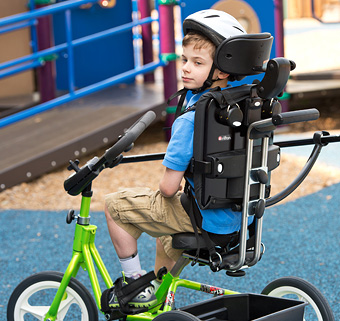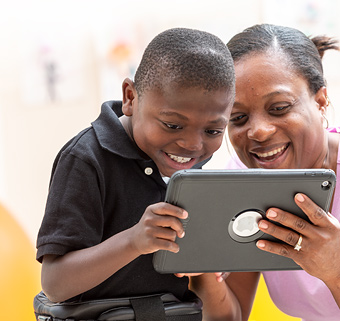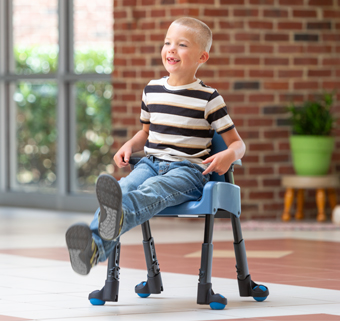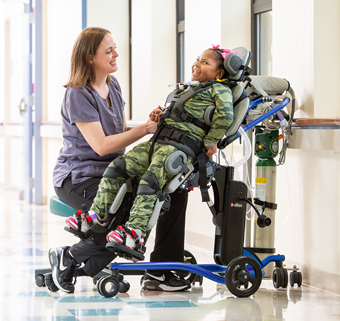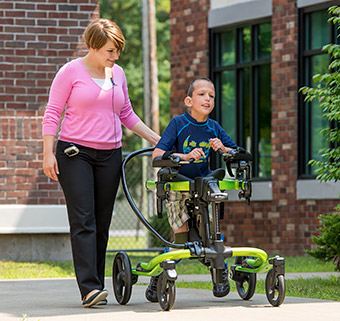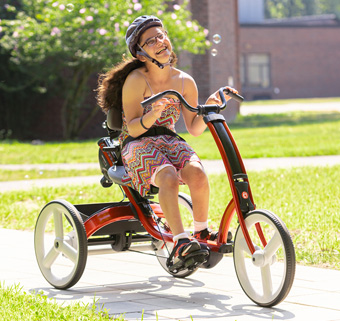Focusing on Participation for Children with Autism
| April 2022 When I first graduated in 1984 and worked with children in the schools, physical therapists typically did not work with children diagnosed with autism spectrum disorder (ASD). Although poorly understood at the time, an overwhelming amount of research on the diagnosis of ASD and changes in science have occurred since then. As we continue to learn more about autism, and the number of children with this diagnosis increases (one in 44 children as of December 2021, according to the CDC),1 most school physical therapists will likely have children with autism, especially younger children, on their caseloads.
When I first graduated in 1984 and worked with children in the schools, physical therapists typically did not work with children diagnosed with autism spectrum disorder (ASD). Although poorly understood at the time, an overwhelming amount of research on the diagnosis of ASD and changes in science have occurred since then. As we continue to learn more about autism, and the number of children with this diagnosis increases (one in 44 children as of December 2021, according to the CDC),1 most school physical therapists will likely have children with autism, especially younger children, on their caseloads.
The research on motor development in this population has been a particular area of focus. Studies reveal that children with ASD may demonstrate fine and gross motor delays including low muscle tone, balance, coordination, and motor planning deficits. Recent systematic reviews show a link between autism and gross motor delays early in life (Lim et al., 2021).2 Motor delays impact not only the acquisition of fundamental gross motor skills needed for gross motor play but also can have significant impacts on cognitive development, social-communication skills, and overall quality of life (Case & Yun, 2019; Hedgecock et al., 2018; Holloway & Long, 2019; West et al., 2019).3,4,5,6 Lack of fundamental motor skill development in young children may result in withdrawal from play. This lack may lead to decreased opportunities to engage in social and communication-based interactions during play at recess or in physical education class.
Participation in physical activities at school, home, and the community is a major outcome area for physical therapists serving young children with disabilities, and it is vital to know that change in one area of development influences change in other areas. In most studies of teaching fundamental motor skills to young children with ASD, motor-based interventions led to an increase in language skills, indicating language and motor system interdependence. These findings also suggest that co-treatment between physical and occupational therapists alongside speech-language pathologists may be warranted when working with children with ASD (Odeh et al., 2020).7 Though physical therapists have historically received little training in PT school on the subject of working with children with ASD, it is becoming an increasingly important focus area for PTs, to be available for facilitation of play and participation in gross motor activities, through direct or consultative roles. As movement specialists, PTs can optimize a child’s ability to participate with their peers in the school setting by adjusting environmental factors. For instance, a child with ASD may have low muscle tone and benefit from an adaptive seat. I have long advocated for the Rifton Compass Chair and Rifton Activity Chair for children with low muscle tone who need more support in their classroom.
As a school PT working with young children with a primary or secondary diagnosis of ASD, I often provide consultation and work in collaboration with physical education teachers, adapted physical education teachers, and general and special education teachers on how to further help children with ASD participate with their peers at school. As physical therapists continue to recognize the evidence and value of participation-based therapy in the home, school, and community, we should consider our role in helping children with autism who may benefit from school-based physical therapy.
References
- Maenner MJ, Shaw KA, Bakian AV, et al. Prevalence and Characteristics of Autism Spectrum Disorder Among Children Aged 8 Years – Autism and Developmental Disabilities Monitoring Network, 11 Sites, United States, 2018. MMWR Surveill Summ 2021;70(No. SS-11):1-16. DOI: http://dx.doi.org/10.15585/mmwr.ss7011a1external icon.
- Lim YH, Licari M, Spittle A, Watkins RE, Zwicker JG, Downs J, Finlay-Jones A. Early Motor Function of Children With Autism Spectrum Disorder: A Systematic Review. Pediatrics February 2021; 147 (2): e2020011270. DOI 10.1542/peds.2020-011270
- Case L, Yun J. The Effect of Different Intervention Approaches on Gross Motor Outcomes of Children With Autism Spectrum Disorder: A Meta-Analysis. Adapted Physical Activity Quarterly. 2019;36(4):501-526. DOI 10.1123/apaq.2018-0174
- Hedgecock J, Dannemiller LA, Shui AM, Rapport MJ, Katz T. Associations of Gross Motor Delay, Behavior, and Quality of Life in Young Children With Autism Spectrum Disorder, Physical Therapy, Volume 98, Issue 4, April 2018, Pages 251-259, https://doi.org/10.1093/ptj/pzy006
- Holloway JM, Long, TM. The Interdependence of Motor and Social Skill Development: Influence on Participation, Physical Therapy, Volume 99, Issue 6, June 2019, Pages 761-770, https://doi.org/10.1093/ptj/pzz025
- West, K.L. Infant Motor Development in Autism Spectrum Disorder: A Synthesis and Meta-analysis. Child Dev. 2019; 90: 2053-2070. https://doi.org/10.1111/cdev.13086
- Odeh CE, Martell R, Griffin S, Johnson ER, Gladfelter AL. Motor-based interventions improve language outcomes in children with autism: a systematic review. Clinical Archives of Communication Disorders. 2020; 5(1):1-7. DOI http://dx.doi.org/10.21849/cacd.2020.00192
